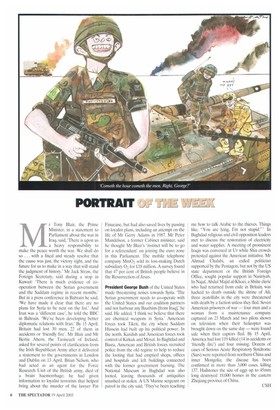im r Tony Blair, the Prime Minister, in a statement to
Parliament about the war in Iraq, said, 'There is upon us a heavy responsibility to make the peace worth the war. We shall do so . . . with a fixed and steady resolve that the cause was just, the victory right, and the future for us to make in a way that will stand the judgment of history.' Mr Jack Straw, the Foreign Secretary, said during a stop in Kuwait: 'There is much evidence of cooperation between the Syrian government and the Saddam regime in recent months.' But in a press conference in Bahrain he said, 'We have made it clear that there are no plans for Syria to be next on the list.' And Iran was a 'different case', he told the BBC in Bahrain. 'We've been developing better diplomatic relations with Iran.' By 15 April, Britain had lost 30 men, 22 of them in accidents or 'friendly fire'. Mr Blair and Mr Berne Ahern, the Taoiseach of Ireland, asked for several points of clarification from the Irish Republican Army after it delivered a statement to the governments in London and Dublin on 13 April. Brian Nelson, who had acted as an agent for the Force Research Unit of the British army, died of a brain haemorrhage; he had given information to loyalist terrorists that helped bring about the murder of the lawyer Pat Finucane, but had also saved lives by passing on loyalist plans, including an attempt on the life of Mr Gerry Adams in 1987. Mr Peter Mandelson, a former Cabinet minister, said he thought Mr Blair's 'instinct will be to go for a referendum' on joining the euro zone in this Parliament. The mobile telephone company Mm02 sold its loss-making Dutch subsidiary 02 for £.18 million. A survey found that 47 per cent of British people believe in the Resurrection of Jesus.
President George Bush of the United States made threatening noise., towards Syria. 'The Syrian government needs to co-operate with the United States and our coalition partners and not harbour any Baathists [from Iraq]; he said. He added, 'I think we believe that there are chemical weapons in Syria.' American forces took Tikrit, the city where Saddam Hussein had built up his political power. In the north, Kurdish and American forces took control of Kirkuk and Mosul, In Baghdad and Basra, American and British forces recruited police from the old regime to help to reduce the looting that had emptied shops, offices and hospitals and left buildings connected with the former government burning. The National Museum in Baghdad was also looted, leaving thousands of antiquities smashed or stolen. A US Marine sergeant on patrol in the city said, 'They've been teaching
me how to talk Arabic to the thieves. Things like, "You are lying, I'm not stupid."' In Baghdad religious and civil opposition leaders met to discuss the restoration of electricity and water supplies. A meeting of prominent Iraqis was convened at Ur while Shia crowds protested against the American initiative, Mr Ahmad Chalabi, an exiled politician supported by the Pentagon, but not by the US state department or the British Foreign Office, sought popular support in Nasiriyah. In Najaf, Abdul Majid al-Khoei, a Shiite cleric who had returned from exile in Britain, was hacked to death outside the shrine of Ah; three ayatollahs in the city were threatened with death by a faction unless they fled. Seven American prisoners of war — four men and a woman from a maintenance company captured on 23 March and two pilots shown on television when their helicopter was brought down on the same day — were found safe when their captors fled. By 15 April, America had lost 119 killed (14 in accidents or 'friendly fire') and four missing. Dozens of cases of Serious Acute Respiratory Syndrome (Sars) were reported from northern China and inner Mongolia; the disease has been confirmed in more than 3,000 cases, killing 137. Hailstones the size of eggs up to 45mm long destroyed 18,000 homes in the eastern Zhejiang province of China


































































 Previous page
Previous page